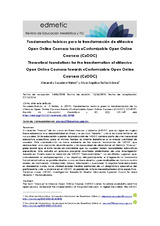Mostrar el registro sencillo del ítem
Fundamentos teóricos para la transformación de «Massive Open Online Courses» hacia «Customizable Open Online Courses» (CzOOC)
| dc.contributor.author | Escudero Nahón, Alexandro | |
| dc.contributor.author | Núñez Urbina, Alicia Angélica | |
| dc.date.accessioned | 2019-11-13T16:14:29Z | |
| dc.date.available | 2019-11-13T16:14:29Z | |
| dc.date.issued | 2019 | |
| dc.identifier.issn | 2254-0059 | |
| dc.identifier.uri | http://hdl.handle.net/10396/19097 | |
| dc.description.abstract | El carácter “masivo” de los cursos en línea masivos y abiertos (MOOC, por sus siglas en inglés) hace referencia a su disponibilidad en línea y su acceso “abierto”, y no a las características de sus usuarios. En la educación superior, la producción de MOOC siempre parte de una necesidad educativa específica, pero al mismo tiempo se intenta beneficiar a la mayor cantidad de usuarios. Esta contradicción se hace evidente en las nuevas taxonomías de MOOC que demuestran una creciente diversificación y la necesidad de abandonar el término “masivo”, para asumir que el éxito reside en considerar que los usuarios tienen necesidades educativas específicas. Este estudio en proceso presenta resultados preliminares de una Investigación Basada en Diseño para la creación de MOOC “personalizables”. Los resultados sugieren que, considerando la autopercepción y los objetivos del participante, e integrando la taxonomía Socioformativa, es posible diseñar cursos en línea abiertos y personalizables en torno a cuatro niveles de motivación: Introductorio, Básico, Intermedio y Avanzado. El objetivo final del estudio es desarrollar cursos cuya utilidad pueda medirse partiendo de un diagnóstico educativo del participante y de su avance en el MOOC, sin perder de vista la necesidad educativa específica. | es_ES |
| dc.description.abstract | The term "massive" in Massive Open Online Courses (MOOC) refers to online availability and the open access, instead of the characteristics of the potential users. In Higher Education, the MOOC production process always starts from a specific educational need, but at the same time, it tries to benefit the largest number of users. This contradiction is evident in the new MOOC taxonomies that demonstrate an increasing diversification and the need to abandon the term "massive", in order to assume that success lies in considering that potential users have specific academic needs. This ongoing research presents preliminary results of a Design-Based Research for the design of "customizable" MOOC. The results suggest that, considering the self-perception and the educational objectives of the participant, and integrating the Socioformative taxonomy, it is possible to design open and customizable online courses with four levels of motivation: Introductory, Basic, Intermediate and Advanced. The main objective of the study is to develop MOOC whose usefulness can be measured based on an educational diagnosis of the educational participant and its progress in the MOOC, without losing sight of their specific educational needs. | es_ES |
| dc.format.mimetype | application/pdf | es_ES |
| dc.language.iso | spa | es_ES |
| dc.publisher | UCOPress | es_ES |
| dc.rights | https://creativecommons.org/licenses/by/3.0/ | es_ES |
| dc.source | Edmetic 8 (2), 129-149 (2019) | es_ES |
| dc.subject | MOOC | es_ES |
| dc.subject | Investigación basada en diseño | es_ES |
| dc.subject | Educación superior | es_ES |
| dc.subject | Higher Education | es_ES |
| dc.subject | Cursos en Línea Abiertos y Personalizados | es_ES |
| dc.subject | Design-based research | es_ES |
| dc.subject | Higher education | es_ES |
| dc.subject | Customizable Open Online Courses | es_ES |
| dc.title | Fundamentos teóricos para la transformación de «Massive Open Online Courses» hacia «Customizable Open Online Courses» (CzOOC) | es_ES |
| dc.title.alternative | Theoretical foundations for the transformation of «Massive Open Online Courses» towards «Customizable Open Online Courses» (CzOOC) | es_ES |
| dc.type | info:eu-repo/semantics/article | es_ES |
| dc.relation.publisherversion | http://www.uco.es/ucopress/ojs/index.php/edmetic/index | es_ES |
| dc.rights.accessRights | info:eu-repo/semantics/openAccess | es_ES |

